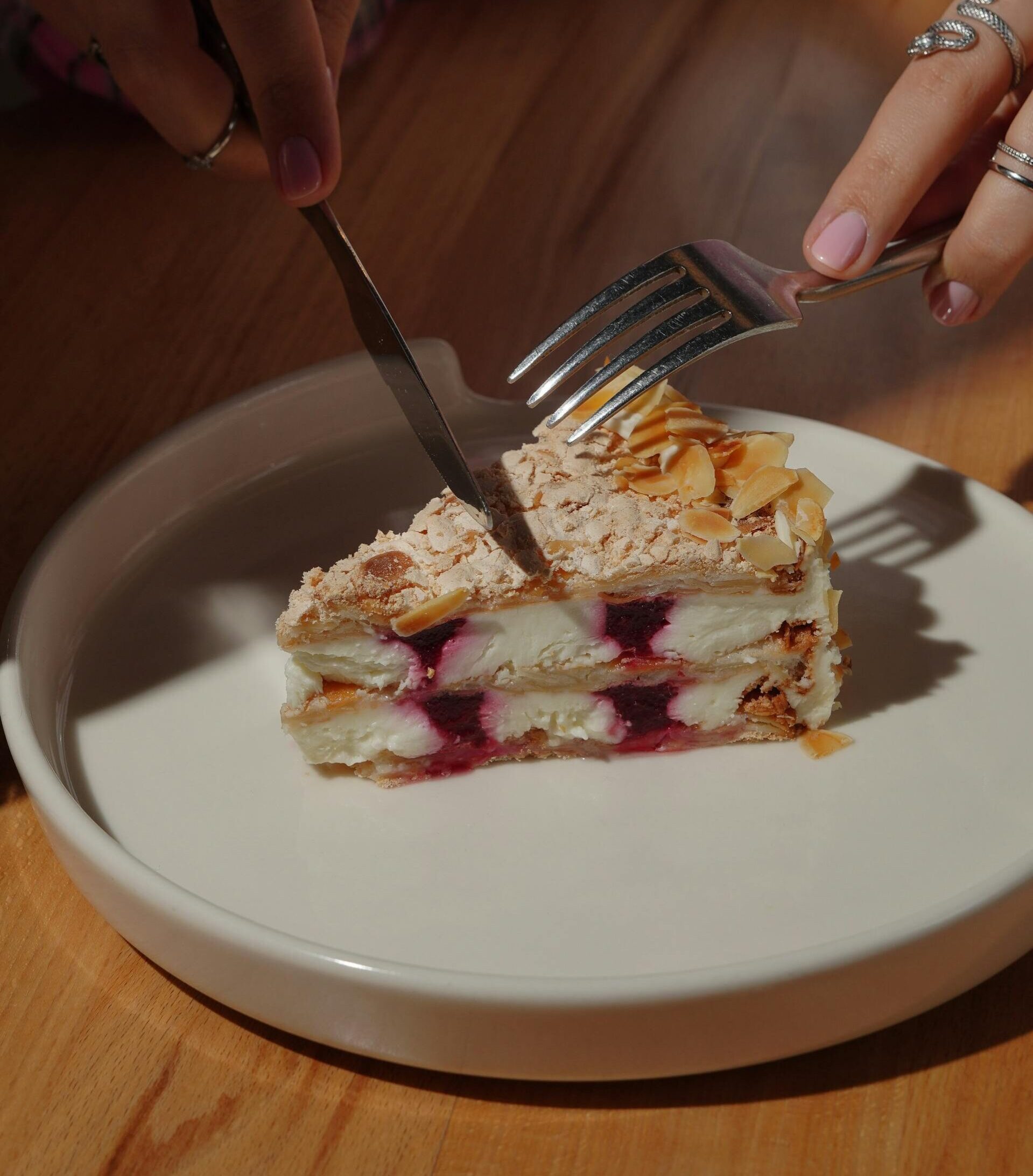Understanding Food Guilt and Why It Happens
If you’ve ever felt guilty after eating a certain food or for eating more than you “planned on eating”, you’re not alone. Food guilt is incredibly common, especially in a culture that praises “clean eating” and treats indulgence like a moral failure.
That all-or-nothing mentality can make it feel like you’re either being “good” or you’ve completely ruined everything. But the reality is, this mindset often sets us up to feel like we’ve “failed” when we’re just being human.
The truth is, food guilt isn’t a personal flaw – it’s a learned response. The good news? It can be unlearned, too.
Why Restriction is Not the Solution
The Diet-Guilt-Rebound Cycle
Let’s say you ate more than usual over the weekend. The knee-jerk reaction? “I need to make up for it” – skip meals, cut carbs, & start fresh on Monday. But the truth is that only sets you up for another round of cravings, frustration, and, yep…more guilt.
This pattern (restrict → binge → guilt → repeat) isn’t about a lack of willpower, it’s a survival response. When we restrict, our bodies get louder with cravings, and our brains pile on the shame. Guilt might feel like it’s pushing you to “be better,” but more often, it just keeps you stuck.
What Your Body Actually Needs After Over-Eating
Instead of punishing yourself after over-eating, and thinking “How do I undo this?” ask, “What would support me right now?”
Try this simple framework: H.E.A.L.:
- Hydrate: Sip on water or a herbal tea to support digestion and help your body naturally rebalance.
- Engage in gentle movement: A short walk, a bike ride, or some light stretching can aid digestion and help you reconnect with your body.
- Add nourishment: Don’t skip your next meal. Focus on foods that feel supportive—think fiber, protein, and healthy fats.
- Lift your mood: Do something that brings you true joy and allow yourself to just move on instead of punishing yourself – watch a favorite show, get fresh air, call a friend, or treat yourself to a manicure.
Overeating isn’t a moral failing. It’s one blip in a much bigger picture- and you’re allowed to move forward without punishing yourself.
How to Reset Physically — Without Punishing Yourself
Focus on Nourishment, Not “Making Up for It”
Instead of trying to “reset” or go to extremes after over-eating, let’s try something different this time. In fact, the best thing you can do after over-eating is return to regular, balanced meals.
Skipping the next meal or drastically cutting back on your intake only reinforces the cycle. Instead, try to start your day with foods that feel nourishing, satisfying, and gentle on your system.
Hydration, Fiber, & Protein: Your Recovery Allies
Focus on simple ways to stabilize your blood sugar, cravings, and energy. After over-eating try to focus on your recovery MVPS:
- Hydration + Electrolytes: Stress depletes electrolytes, and both the physical and emotional impact of over-eating can cause a stress response on your system. Try to start your day with a large water with an electrolyte packet or pinch of salt.
- Fiber: Add some fiber to your next meal. Think veggies, fruit, nuts, seeds, or legumes to support digestion.
- Protein: Prioritize protein. Protein helps stabilize your blood sugar and keeps you full, so you’re not chasing cravings all day.
This isn’t about being “perfect.” It’s about creating a routine that supports you, not stresses you out.
Emotional Recovery: Rebuilding Trust with Your Body
Reframing the Narrative
Instead of spiraling into “What’s wrong with me?” mode, try flipping the script:
“What might my body or emotions be trying to tell me?” Maybe you were super hungry. Maybe you were overstimulated, stressed, lonely, or just around foods you don’t usually let yourself enjoy. None of those things mean you messed up – they’re actually clues. And when you respond with curiosity instead of judgment, that’s where the real change starts.
Using Over-Eating as Insight, Not Evidence of Failure
Grab a journal or open a note in your phone and reflect – What was going on this weekend? What did I need more of? What do I want to remember for next time? Overeating isn’t proof that you can’t be trusted, it’s just information. And when you learn from it, you’re already moving forward.
What to Do the Next Time You’re in a Similar Situation
Making Peace with Indulgence
Here’s your reminder: you don’t need to “earn” your favorite foods. Things like dessert, going back for seconds, or enjoying chips at the party aren’t signs of failure – they’re just part of a normal, balanced relationship with food.
When you give yourself full permission to enjoy the foods you love without guilt or overthinking, they actually lose their power. Food becomes just food, not something to obsess over or feel bad about. Health and pleasure can absolutely exist in the same space. In fact, that’s where real balance is.
Gentle Tools for Navigating Social Events with Food
Social events can feel tricky when you’re working on your relationship with food, especially when you have this internal pressure to either “be good” or completely let go. But there’s a middle ground. Here are a few strategies that can help you navigate social events:
- Don’t show up starving. In fact, I often tell clients to eat a snack beforehand (with protein and fiber), so you’re not overly hungry going into the meal.
- Take a moment to scan what’s available before diving in. Choose foods that genuinely satisfy you – both in terms of taste and fullness. You can have the thing you’ve been craving and something nourishing.
- Let yourself enjoy the moment. The truth is, the stress we carry about food is often more damaging than the food itself. Eat what looks good, move on, and come back to your normal routine the next day.
Because at the end of the day, one meal, one night, or even one weekend doesn’t define your health. How you respond afterward matters so much more.
When to Seek Support from a Nutrition Professional
If you feel stuck in this cycle of guilt, restriction, and over-eating, you don’t have to figure it out alone. At One Nutrition Group, we take a personalized approach that looks beyond what’s on your plate and gets to the why behind your food choices. Whether you’re navigating emotional eating, stuck in the binge-restrict cycle, or just want to feel more at ease around food, we’re here to help.
Final Thoughts: Progress, Not Perfection
Healing your relationship with food takes time, and it’s not about “being perfect.” It’s about showing up for yourself with more awareness, more kindness, and less fear around food.
So, if you feel like you ate too much this weekend, remember: one moment doesn’t undo all your progress. You’re not starting over. You’re just continuing on – and you’re doing better than you think.

